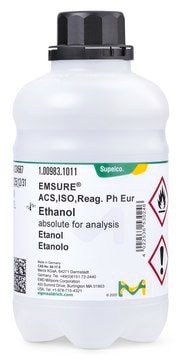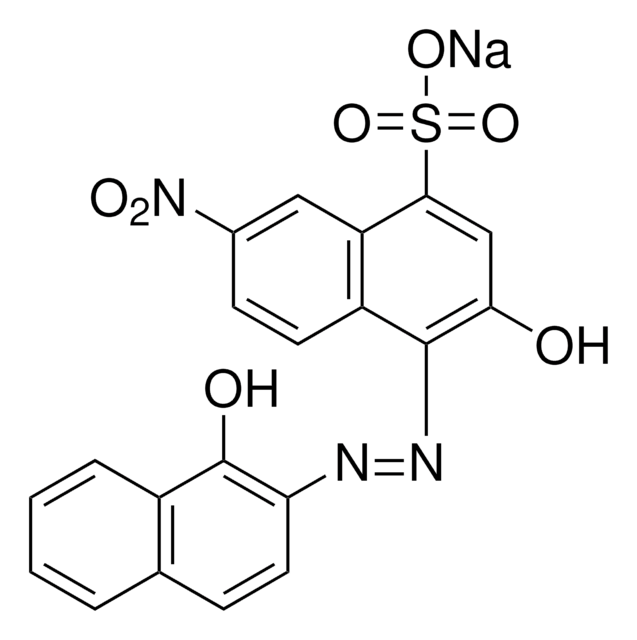1.07531
1-(2-Pyridylazo)-2-naphthol
(PAN) metal indicator, Reag. Ph Eur
Synonim(y):
1-(2-Pyridylazo)-2-naphthol (PAN), PAN
About This Item
Polecane produkty
product name
1-(2-Pyridylazo)-2-naphthol (PAN), metal indicator Reag. Ph Eur
agency
reag. Ph. Eur.
Poziom jakości
Postać
solid
kolor
brick red to orange-brown
clear to almost clear red-orange to brown-orange, 1.0g/L;ethanol
mp
136-141 °C
gęstość nasypowa
190 kg/m3
λmaks.
461-465 nm in ethanol
temp. przechowywania
2-30°C
InChI
1S/C15H11N3O/c19-13-9-8-11-5-1-2-6-12(11)15(13)18-17-14-7-3-4-10-16-14/h1-10H,(H,16,17)/b18-15-
Klucz InChI
RAXUMGMWXZYADR-SDXDJHTJSA-N
Szukasz podobnych produktów? Odwiedź Przewodnik dotyczący porównywania produktów
Powiązane kategorie
Zastosowanie
- Derivative spectrophotometric determination of iridium after preconcentration of its 1-(2-pyridylazo)-2-naphthol complex on microcrystalline naphthalene.: This study explores a spectrophotometric method for determining iridium using 1-(2-Pyridylazo)-2-naphthol (PAN) as a complexing agent, demonstrating an effective approach for trace metal analysis in academic and research applications, highlighting its relevance to environmental monitoring and analytical chemistry (Taher MA et al., 1997).
- Simultaneous determination of gallium(III) and indium(III) by derivative spectrophotometry.: This research presents a derivative spectrophotometric technique for the concurrent determination of gallium and indium, employing PAN for chelation, underscoring its utility in the precise analysis of these metals in various sample matrices, which is crucial for chemists working in analytical fields (Singh VK et al., 2001).
- Second and first-derivative spectrophotometry for efficient simultaneous and individual determination of palladium and cobalt using 1-(2-pyridylazo)-2-naphthol in sodium dodecylsulfate micellar media.: This paper introduces a novel approach for the simultaneous spectrophotometric determination of palladium and cobalt using PAN, offering significant advantages in terms of sensitivity and selectivity, essential for advancing analytical methodologies in chemistry (Eskandari H et al., 2003).
- Zero-crossing second derivative spectrophotometry for simultaneous determination of palladium and nickel using 1-(2-pyridylazo)-2-naphthol in mixed micellar solutions.: This publication details a method for analyzing palladium and nickel using PAN, employing advanced spectrophotometric techniques to enhance detection capabilities, reflecting critical developments in analytical techniques relevant to chemists in academic settings (Eskandari H, 2004).
- Preconcentration of 1-(2-pyridylazo)-2-naphthol-iron(III)-capriquat on a membrane filter, and third-derivative spectrophotometric determination of iron(III).: The study focuses on a preconcentration technique for iron analysis using PAN, demonstrating the application of derivative spectrophotometry in enhancing analytical precision, an essential aspect for researchers focused on trace metal analysis in environmental and industrial samples (Mori I et al., 1994).
Komentarz do analizy
Appearance: brick-red to orange-brown fine powder,eventually cohesive
Appearance of solution (1.0 g/l; ethanol): Clear to almost clear, red-orange to brown-orange
Melting point: 136 - 141 °C
Absorption maximum λmax. (Ethanol): 461 - 465 nm
Spec. Absorptivity A 1%/1cm (λmax; 0.01 g/l; Ethanol): 670 - 720
Suitability as indicator (for metal titration): passes test
Sensitivity test (Reag. Ph Eur): passes test
Kod klasy składowania
11 - Combustible Solids
Klasa zagrożenia wodnego (WGK)
WGK 3
Temperatura zapłonu (°F)
Not applicable
Temperatura zapłonu (°C)
Not applicable
Certyfikaty analizy (CoA)
Poszukaj Certyfikaty analizy (CoA), wpisując numer partii/serii produktów. Numery serii i partii można znaleźć na etykiecie produktu po słowach „seria” lub „partia”.
Masz już ten produkt?
Dokumenty związane z niedawno zakupionymi produktami zostały zamieszczone w Bibliotece dokumentów.
Nasz zespół naukowców ma doświadczenie we wszystkich obszarach badań, w tym w naukach przyrodniczych, materiałoznawstwie, syntezie chemicznej, chromatografii, analityce i wielu innych dziedzinach.
Skontaktuj się z zespołem ds. pomocy technicznej



